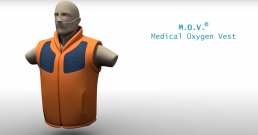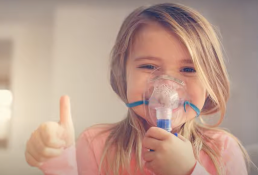Medical Oxygen Vest - Watch it here...
Watch our video on our Medical Oxygen Vest. Based on our experience in this industry we have created our very own vest that could help so many medical oxygen needs.
You will find us...
As long as you know OxygenWorldwide you will find us for all your oxygen needs whilst exploring new sights, visiting family or your next trip to your favourite destination.
Who you going to call...???
If you are planning to travel abroad and need essential medical oxygen as part of your trip. Look no further as OxygenWorldwide is here. Our team have been helping customers travel with oxygen for over 25 years...
Breathing long-term
Life can bring many challenges and coping with a long-term illness can seem to affect every part of your life. Managing and self-management is the key to improving your well-being and coping with flare-ups and challenges.

Oxygen therapy is one major part to this and understanding the treatment and how it works will help you. Many people will feel some anxiety towards using medical oxygen long-term. We all need oxygen as this is our 'fuel' and if there is a lack of oxygen in the blood oxygen therapy is needed to keep the body functioning.
If there is a chronic lack of oxygen this can lead to fatigue, problems with memory and concentration or swelling of the legs amongst other complications.
Medical oxygen helps to keep your organs functioning sufficiently and maintain blood oxygen levels to what is needed for you to maintain a normal life.
Oxygen therapy is beneficial long-term, some may need it for 15 hours a day or whilst sleeping but you will feel the effects long-term to help you feel less tired, more movement even with exercising and better sleep.
ref: image by majamer
Thank you to everyone...
Business as usual at OxygenWorldwide's office!
Thank you to everyone...
>>> Watch our short video below...
Obstructive sleep apnea and supplemental oxygen
Supplemental oxygen eliminates the rise in morning blood pressure experienced by obstructive sleep apnea patients who stop using continuous positive airway pressure (CPAP), the standard treatment for OSA, according to new research published online in the American Thoracic Society's American Journal of Respiratory and Critical Care Medicine.

Many studies have demonstrated an association between OSA, hypertension and cardiovascular disease. Some of these studies have linked the acute rises in blood pressure that OSA patients experience while sleeping to the constant need to wake up when their breathing stops or is partially blocked.
reference: https://www.news-medical.net/news/20180720/Study-Supplemental-oxygen-prevents-rise-in-morning-blood-pressure-in-OSA-patients.aspx
Can oxygen therapy prevent dementia???

Chronic obstructive pulmonary disease (COPD) is the collective term for a group of lung conditions that cause long term breathing difficulties. It is a common condition affecting mainly middle-aged or older adults who smoke, with symptoms including breathlessness and a chesty ‘smokers’ cough. Individuals with COPD are at higher risk of dementia – one current theory suggests that this is due to lower brain oxygen levels as a result of problems with blood supply from blood vessels in the brain. In line with this theory, some studies have reported that giving COPD patients additional oxygen reduced their risk of developing dementia. However, until now, the mechanisms underlying this positive effect had not been fully investigated.
The research team found that blood flow and oxygen delivery to the brain was significantly increased during reading. This was due to blood vessels in the brain becoming dilated in response to the greater oxygen demand when the brain was active. It can thus be concluded that when COPD patients receive additional oxygen it improves the function of blood vessels in their brain.
This study showed that providing extra oxygen improves the function of blood vessels in the brain by matching blood supply to the demands of the brain activity. However, COPD patients typically use this extra oxygen therapy throughout the day and for long periods of time, potentially years. This study does not indicate the influence of long term oxygen therapy on the function of blood vessels in the brain. Despite these potential limitations, this work has set the foundation for the researchers to investigate the biological systems that control oxygen delivery to the brain.
references: http://www.physoc.org/
Getting 'high' on air...
Even the healthiest person would find it difficult to breathe during the warm and very damp weather in the summer season. The patients ailing with a chronic lung disease such as COPD or pulmonary fibrosis have to be very careful. Surprisingly COPD is more common in women than men. Literally, 37% of women are more likely to have COPD than men.
Good nutrition means healthy eating. You need good nutrition to make your body stronger. You should eat a variety of foods every day. When you have COPD, preparing food and eating large meals may lead to shortness of breath. Here are some ways to help prevent shortness of breath.
Eat 6 small meals each day, instead of 3 large meals.

Chewing and digesting food uses up oxygen. When you eat a small meal, you use up less oxygen than when you eat a large meal. In addition, a large meal fills your stomach. A full stomach presses on your diaphragm. The diaphragm is the main muscle we use to breathe. When your stomach presses on your diaphragm, it is harder for you to breathe.
Eat slowly, and breathe evenly
Avoid gas-forming foods like:
- All beans (except green beans)
- Broccoli
- Brussels sprouts
- Cabbage
- Cauliflower
- Cucumbers
- Melons
- Onions
- Raw apples
- Turnips
Your doctor will prescribe the type of oxygen device, the flow rate, and how and when to use it. When traveling OxygenWorldwide can supply in over 120 countries and take any stress out of the arranging of your oxygen supply.
ref: http://www.upmc.com














